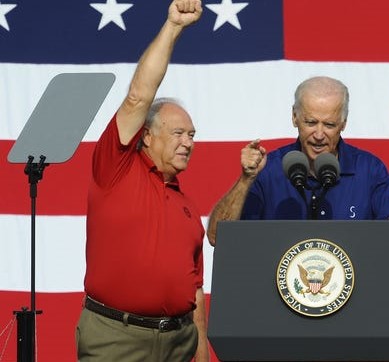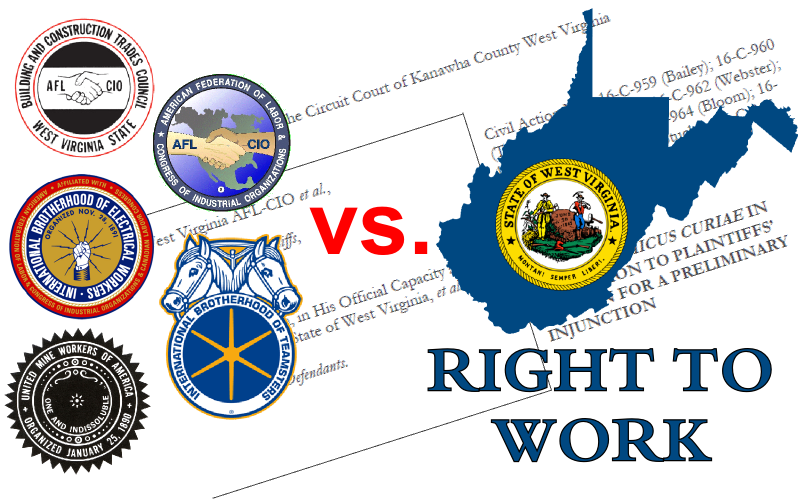Flight Attendant Sues Transport Union for Religious Discrimination
The following article is from the National Right to Work Legal Defense Foundation’s bi-monthly Foundation Action Newsletter, January/February 2021 edition. To view other editions or to sign up for a free subscription, click here.
Flight Attendant Sues Transport Union for Religious Discrimination
Please stow your religious objections: TWU union bosses forced Allegiant Air flight attendant Annlee Post to fund the union in violation of her religious beliefs and federal law.
KNOXVILLE, TN – Allegiant Air flight attendant Annlee Post filed a federal lawsuit in November against Transport Workers Union of America Local 577 (TWU) because the union refused to accommodate her religious beliefs. She received free legal aid from National Right to Work Foundation staff attorneys.
Post is a Christian, and she objects to funding the TWU on religious grounds. As recognized in the 2015 EEOC v. Abercrombie & Fitch Supreme Court decision, Post is not required to satisfy any special requirements to merit religious accommodation under Title VII of the Civil Rights Act of 1964.
To exercise her rights, Post sent two letters to union officials making them aware of her objection and asking that her dues payments be redirected to charity.
EEOC Issues “Right to Sue” Letter to Union Objector
When TWU officials refused this request, she filed a charge with the Equal Employment Opportunity Commission (EEOC) against the union.
The EEOC was unable to resolve Post’s charge, but it issued a “Right to Sue” letter in August 2020, allowing her to file a federal lawsuit against the union to protect her rights. Post then filed a complaint in federal court alleging TWU officials illegally discriminated against her by refusing to accommodate her and threatening to revoke her bidding privileges.
Bidding privileges control a flight attendant’s ability to schedule trips, work, vacations and days off. Post asked the court for an order stopping TWU officials from requiring her and other employees to pay union fees that violate their sincere religious beliefs.
Post’s lawsuit also alleges that union officials violated the United States Constitution’s First and Fourteenth Amendments, which require union officials to follow specific procedures to demand forced dues payments. The union did not follow those procedures here.
Union officials did not provide a notice of how the forced-fee amount was calculated and an audit of the union’s financial records. Nor did they give a notice of the procedure to challenge the fee amount.
Federal Law Prevents Union Threats to Workplace Privileges
Even though she lives in Tennessee, which has enacted Right to Work protections so workers who object to union membership can freely abstain from funding union activities for any reason, Post is subject to the Railway Labor Act (RLA) because she works for an airline.
The RLA overrides state Right to Work laws and allows union officials to compel union fees, but only “as a condition of continued employment.” The RLA does not permit forced-dues payments based on any other condition — such as bidding privileges. Post’s Foundation staff attorneys argue that TWU’s monopoly bargaining agreement with Allegiant is invalid because it requires dues payments to maintain bidding privileges, whereas payment “as a condition of continued employment” is the only legal forced unionism agreement under the RLA.
“Annlee Post and others like her should not have to choose between privileges at work and their religious beliefs,” said National Right to Work Foundation Vice President Patrick Semmens. “TWU bosses knew about Ms. Post’s objections, but refused to accommodate them as longstanding federal law requires. They instead threatened to take away her bidding privileges, simply because she would not fund their organization in violation of her religious faith.
“This case is a reminder of why no worker should be forced to fund a union with which he or she disagrees, no matter whether their objection is religious or for any other reason,” Semmens said.
Push to Remove UFCW Union Could End Pro-Union Boss “Contract Bar” Policy
The following article is from the National Right to Work Legal Defense Foundation’s bi-monthly Foundation Action Newsletter, September/October 2020 edition. To view other editions or to sign up for a free subscription, click here.
Non-statutory NLRB policy hinders workers’ right to vote out an unwanted union
 Employees at the Selbyville, DE, Mountaire Farms plant rally to vote out unpopular UFCW honchos from their workplace, as union lawyers scramble to block the workers’ votes from being counted.
Employees at the Selbyville, DE, Mountaire Farms plant rally to vote out unpopular UFCW honchos from their workplace, as union lawyers scramble to block the workers’ votes from being counted.
WASHINGTON, DC – The National Labor Relations Board (NLRB) has announced that it will review the so-called “contract bar” doctrine, which prevents employees from exercising their right to vote an unpopular union out of their workplace for up to three years if union officials and their employer have finalized a monopoly bargaining contract.
This is the latest development in a case by a Selbyville, Delaware-based Mountaire Farms poultry employee, Oscar Cruz Sosa, against the United Food and Commercial Workers (UFCW) Local 27 union. Cruz Sosa submitted a petition in February for a vote on whether Local 27 should be removed as monopoly bargaining agent in his workplace. The petition was signed by hundreds of his coworkers, more than the percentage required to trigger such a vote.
Worker Obtains Foundation Help after Union Attempts to Block Vote
After he submitted the petition, UFCW bosses immediately claimed that the “contract bar” should block Cruz Sosa and his coworkers from even having an election, because the monopoly bargaining agreement between Mountaire and the union had been signed less than three years earlier.
Cruz Sosa then obtained free legal assistance from National Right to Work Foundation staff attorneys in defending his and his coworkers’ right to vote. With Foundation aid, he also hit UFCW agents with federal unfair labor practice charges for imposing an illegal forced-dues clause on the workplace and threatening him after he submitted the petition.
When the NLRB Regional Director in Baltimore heard the election case, he ruled that the union contract contains an unlawful forced-dues clause that mandates workers immediately pay union dues upon hiring or be fired. Under NLRB precedent, an illegal forced-dues clause means the “contract bar” cannot apply, allowing the vote to proceed.
UFCW’s Desperate Attempt to Block Vote Triggers NLRB Review of “Contract Bar”
Despite the longstanding precedent supporting the Regional Director’s ruling, UFCW union lawyers filed a Request for Review, asking the full NLRB to reverse the Regional Director and halt the election.
In response, Cruz Sosa’s Foundation staff attorneys opposed the union’s efforts to block the vote. They also argued that, if the Board were to grant the union’s Request for Review, it should also reconsider the entire “contract bar” policy, which has no statutory basis in the NLRA. The Foundation’s legal brief noted that the “contract bar” runs counter to the rights of workers under the NLRA, which explicitly include the right to vote out a union a majority of workers oppose.
Just hours after the voting process in the decertification election had begun, the NLRB issued its order granting the union’s Request for Review, while also accepting the Foundation’s request to reconsider the entire “contract bar” doctrine. The order noted “that it is appropriate for the Board to undertake in this case a general review of its ‘contract bar’ doctrine.”
Given the precedential import of this case, the NLRB solicited amicus briefs on whether the “contract bar” should be allowed to stand. UFCW officials, still desperate to throw a wrench in Cruz Sosa and his coworkers’ effort to vote them out, demanded that the NLRB rescind its request for amicus briefs in the case, but that effort was quickly rebuffed.
“We urge the NLRB to swiftly overturn this outrageous non-statutory policy, which lets union bosses undermine for up to three years the free choice of workers that is supposed to be at the center of federal labor law,” commented National Right to Work Foundation Vice President and Legal Director Raymond LaJeunesse. “The very premise of the NLRB-created ‘contract bar,’ that union bosses should be insulated from worker decertification efforts, is completely backwards.”
LaJeunesse added: “Union officials across the country use all types of tactics to get workers into unions but rely on government power and legal tricks to prevent them from getting out.”
Mix to US Attorney: Let Workers Refuse to Fund Scandal-Ridden UAW Bosses
The following article is from the National Right to Work Legal Defense Foundation’s bi-monthly Foundation Action Newsletter, September/October 2020 edition. To view other editions or to sign up for a free subscription, click here.
Letter exhorts worker-empowering reforms as part of potential federal takeover of UAW
Democratic presidential candidate Joe Biden, seen here with former UAW top boss Dennis Williams, is promising UAW officials the power to extract forced dues from every auto worker under their monopoly power.
DETROIT, MI – National Right to Work Foundation President Mark Mix sent a letter to US Attorney for the Eastern District of Michigan Matthew Schneider, on the eve of a recent meeting between Schneider and current United Auto Workers (UAW) union President Rory Gamble. Mix urged Schneider to advance worker-empowering reforms for the corruption-ridden UAW during the meeting, which was scheduled to discuss the union’s future after a massive embezzlement and racketeering scandal that continues to unfold.
The sprawling federal probe into the union hierarchy has exposed how UAW union bosses siphoned union dues to support their lavish limousine lifestyles, including months-long opulent golf vacations in luxury condos and private villas, custom-made Napa wine, spa and amusement park visits, and $60,000 cigar-buying sprees.
The investigation has yielded the convictions of at least 14 people, including at least 11 affiliated with the UAW. Gary Jones, who was UAW President up until last fall, pled guilty to embezzling more than $1.5 million. His last official act as head of the union was to cast the tie-breaking vote to put himself on paid leave and elevate long-time ally Gamble to top boss. Earlier this year, The Detroit News reported that Gamble was also the subject of the investigation and suspected of taking kickbacks or bribes from a vendor in exchange for lucrative contracts with the union.
While a full federal takeover of the union has been proposed by federal law enforcement officials, UAW honchos appear to be hoping that a potential Joe Biden presidency will let them avoid such a fate. The UAW hierarchy in April officially endorsed Biden, who has promised to massively increase union bosses’ power over workers nationwide if elected.
In the letter, Mix points out that coercive privileges granted to the UAW by federal law created an environment in which UAW officials could all too easily take advantage of workers.
Letter Pinpoints Coercion as Source of Rampant UAW Malfeasance
“UAW union officials have perpetrated this abuse using the extraordinary powers granted to them by federal law,” specifically “their dual coercive powers of monopoly exclusive representation and authorization to cut deals mandating that rank-and-file workers pay union dues or fees, or else be fired,” Mix wrote.
The reforms Mix urged are designed to “squarely address” this coercive control that union officials have over rank-and-file workers. They include “impos[ing] an immediate recertification vote for every union local touched by the corruption,” “empower[ing] workers as individuals to fight corruption through refusing to fund the UAW,” and “impos[ing] with providing full transparency to rank-and-file workers of all union financial transactions.”
Mix concluded by pressing Schneider to “try some new ideas” that focus on empowering the workers “whose trust and money has been systematically stolen” in light of past fixes that have not deterred other union bosses from abusing their power.
Biden Presidency Poised to Let UAW Upper Echelon Off the Hook
If, as UAW brass hope, Biden is elected president, all worker victims of the UAW corruption could be forced to once again pay money to the union or else be fired. In 27 states, including Michigan where the UAW is headquartered, Right to Work laws ensure that no worker can be fired for refusing to tender dues or fees to a union hierarchy as a condition of employment. Biden has promised to ban these laws if elected.
“The revelations of greed and shamelessness that continue to arise in the UAW probe are no surprise to anyone who is familiar with the coercive privileges granted union bosses by federal law,” commented National Right to Work Foundation President Mark Mix. “Though we urge Mr. Schneider to push the reforms detailed in our letter which will put the power to hold union officials accountable in workers’ hands, there is ultimately no place in federal law for provisions that force workers to pay union bosses to keep or get a job.”
Mix continued: “Joe Biden and other forced-dues proponents ought to explain why they believe tens of thousands of workers in non-Right to Work states should have been fired had they sought to cut off the forced dues being paid to Gary Jones’ corrupt UAW.”
Workers Win Over $30K After Challenging Teamsters Forced-Dues Scheme
The following article is from the National Right to Work Legal Defense Foundation’s bi-monthly Foundation Action Newsletter, July/August 2020 edition. To view other editions or to sign up for a free subscription, click here.
Cases demonstrate Teamsters union bosses’ widespread use of illegal coercive tactics
Notorious union boss James Hoffa heads the Teamsters union, which is subjecting workers nationwide and across industries to illegal schemes.
MINNEAPOLIS, MN – With free legal aid from National Right to Work Foundation staff attorneys, workers have won multiple settlements after Teamsters union bosses refused to respect their legal rights not to support a union as a condition of employment.
In one settlement, Minnesota employees James Connolly and Charles Winter won $30,000 in back pay from their former employer after they were illegally fired for choosing not to formally join the Teamsters Local 120 union.
Meanwhile, Milwaukee factory employee Tyler Lewis secured a settlement with Teamsters “General” Local Union No. 200. Union officials had denied his right under Wisconsin’s Right to Work Law and the National Labor Relations Act (NLRA) to not financially subsidize a union.
Two Minnesota Employees Obtain $30,000 in Back Pay
Connolly and Winter each filed unfair labor practice charges against both the Teamsters and their former employer, building materials company OMG Midwest, after they were unlawfully fired.
The two workers charged that company and union officials falsely told them several times that union membership was required as a condition of employment. Both men charged that the misinformation about membership and their firings violated Section 7 of the NLRA, which protects the “right to refrain from any or all” union activities.
In addition to winning $30,000 in back pay from their former employer, the settlement stipulates that OMG Midwest take additional action. The company must “remove all references to the termination” from the two employees’ personnel files, post notices at OMG’s facility in Belle Plaine, Minnesota, and distribute those notices individually to all employees. The notices will explain that workers cannot be forced to join a union as a condition of employment.
In a later settlement, Teamsters bosses were ordered to refrain from telling “employees or applicants that union membership is a condition of employment” and to inform employees “of their right to be non-members.” Additionally, the Teamsters will reimburse any employee who worked at OMG Midwest who chooses to become a non-member for the difference between full union dues and the portion payable by non-member objectors under the Foundation-won Supreme Court decision in CWA v. Beck.
“It is good news that Mr. Connolly and Mr. Winter have won these settlements which require their former employer and Teamsters union bosses to make reparations for violating longstanding worker protections. But such instances of abuse will continue unless Minnesota legislators pass Right to Work protections for their state’s private sector employees,” commented National Right to Work Foundation Vice President and Legal Director Raymond LaJeunesse. “This case demonstrates, yet again, why Teamsters bosses have a well-earned reputation for using coercive tactics against workers who refuse to toe the union line.”
Milwaukee Worker Receives Refund of Union Dues in Foundation-Won Settlement
Under the terms of the settlement for Lewis, Teamsters Local 200 officials agreed to repay union dues, plus interest, seized from Lewis’ paycheck after he resigned his union membership and revoked his dues deduction authorization.
After he was hired to work at Snap-on Logistics Company, a union official told Lewis that he must become a union member and authorize the deduction of union dues from his paycheck. That union demand violated longstanding law dating back to 1963.
In September 2019, Lewis resigned from the union and revoked his authorization of dues deductions. But union bosses refused to honor Lewis’ request to stop union dues deductions and continued to seize dues from his paycheck.
In response, Lewis filed an unfair labor practice charge with the NLRB with the assistance of Foundation staff attorneys. The favorable settlement secured for Lewis resolves his charge. Lewis’ charge against the Teamsters pointed out that the monopoly bargaining contract was signed after the effective date of Wisconsin’s Right to Work Law. Therefore, the so-called “union security” clause in the contract was illegal and he should never have been forced to pay any amount to the union.
“This settlement for Mr. Lewis is yet another victory for the rights of all Wisconsin workers. However, it should not take federal labor charges for union bosses to acknowledge the basic rights of employees in the Badger State,” said LaJeunesse.
Delaware Poultry Worker Charges UFCW Brass with Illegal Dues Deductions, Threats
The following article is from the National Right to Work Legal Defense Foundation’s bi-monthly Foundation Action Newsletter, July/August 2020 edition. To view other editions or to sign up for a free subscription, click here.
Foundation attorneys assist worker leading effort to oust unpopular union
Employees at the Selbyville, DE, Mountaire Farms plant were subjected to an illegal forced-dues clause by UFCW union bosses, who for months have also tried to block their right to vote on whether union officials deserve to stay.
SELBYVILLE, DE – With free legal aid from National Right to Work Foundation staff attorneys, Mountaire Farms employee Oscar Cruz Sosa hit United Food and Commercial Workers (UFCW) Local 27 union bosses with federal unfair labor practice charges. The charges assert that union officials violated his and his coworkers’ rights by enforcing an illegal forced-dues provision in the monopoly bargaining contract, and that union bosses threatened him for spearheading a petition for a vote to remove the union.
Cruz Sosa’s charges come after the National Labor Relations Board (NLRB) Region 5 Director in Baltimore rejected union arguments that the decertification election Cruz Sosa and his coworkers requested should be blocked. Under a controversial NLRB-created policy known as the “contract bar,” employees’ statutory right to hold a decertification vote to remove a union can be blocked for up to three years when a union contract is in place.
However, under longstanding precedent the “contract bar” to decertification does not apply when the monopoly bargaining contract in place contains an unlawful forced-dues clause.
Worker Deflects Union Legal Attack by Exposing Illegal Forced-Dues Clause
Prior to this charge, the NLRB Region 5 Director found that the contract between Mountaire Farms and UFCW union officials illegally required workers to immediately pay union dues upon being hired, instead of providing new hires a 30-day grace period the federal labor statute and longstanding precedent require. Because Delaware lacks Right to Work protections for its employees, Cruz Sosa and his coworkers can be required to pay union fees to keep their jobs.
The NLRB Region 5 Director thus ruled that the vote Cruz Sosa and his coworkers requested should proceed, and scheduled the vote to decertify the union. Cruz Sosa’s unfair labor practice charge, citing that decision’s finding that the forced-dues clause is unlawful, asks the NLRB to order union officials to refund all dues and fees seized from him and his coworkers under the auspices of that illegal clause.
Even after they were unable to block the election with the “contract bar,” UFCW union officials did not give up. In fact, union lawyers have initiated at least three other “blocking charges” against the employer in a last-ditch effort to block the vote, another common tactic used by union bosses to halt or delay workers’ attempts to vote them out.
UFCW union officials’ attempts to stifle the decertification effort didn’t end there. They also asked that any vote be delayed and changed to a“mail-in” vote, even though it had already been scheduled to take place in person on the premises where the workers work every day. In the responses to the union attempts to scuttle the planned vote, Cruz Sosa’s Foundation-provided attorneys argued that the vote should go forward as scheduled, because on-site elections are the NLRB’s preferred method for conducting elections, and the on-site vote was announced to workers weeks ago.
Cruz Sosa also alleged that a UFCW agent came to his house uninvited back in March. The agent warned him “that the decertification process being undertaken was ‘illegal’” and that a court battle was coming, according to his charge filed at NLRB Region 5.
Union Agents Threaten Worker after He Attempts to Exercise Rights
Cruz Sosa’s charge states that this was “threatening” and “coercive behavior” and a clear attempt to restrain him and his coworkers in the exercise of their right under the National Labor Relations Act to vote out an unwanted union.
“The threats and dues deductions in this case show how union bosses regularly trample workers’ rights in order to keep forced dues rolling into their coffers,” observed National Right to Work Foundation Vice President Patrick Semmens. “We hope that NLRB Region 5 will immediately prosecute the union for these violations, and ultimately order the union to refund all dues and fees collected from Mountaire Farms workers under the unlawful forced-dues clause.”
Semmens continued: “While UFCW officials were caught red-handed in this case, these types of forced union dues abuses will continue until Delaware workers have the protection of a Right to Work law, which ensures that all union membership and financial support are strictly voluntary.”
Foundation Victories Stop Illegal Forced Union Dues for Public Employees
The following article is from the National Right to Work Legal Defense Foundation’s bi-monthly Foundation Action Newsletter, January/February 2020 edition. To view other editions or to sign up for a free subscription, click here.
Settlements end Big Labor restrictions on workers exercising Janus rights in New Mexico, Ohio
Shopping for a refund: Ohio school bus driver Donna Fizer won a refund of illegally seized dues after fighting schemes meant to block public employees from exercising their rights under the Foundation-won Janus decision.
CINCINNATI, OH – National Right to Work Legal Defense Foundation staff attorneys continue to win settlements for workers who have been trapped by arbitrary union-created “escape periods” or “window periods,” which violate workers’ rights by preventing them from stopping dues deductions.
In the 2018 Foundation-won Janus v. AFSCME decision, the U.S. Supreme Court held that requiring public sector employees to pay union bosses is unconstitutional. Yet, union bosses continue to tell workers they can only stop dues deductions during limited periods. After Foundation-backed lawsuits, however, they often choose to settle with workers rather than face Foundation staff attorneys in court.
In November, Ohio bus driver Donna Fizer won a settlement against Ohio Association of Public School Employees (OAPSE). With Foundation legal aid, Fizer sued OAPSE for continuing to take money from her paycheck after she resigned her union membership, which violates the Janus ruling’s protection of her First Amendment rights.
Workers Win Battles Coast to Coast Stopping Unconstitutional Dues
Fizer’s victory came when Foundation staff attorneys filed a federal lawsuit for her, contending the dues seizures OAPSE made from her paycheck after she resigned her union membership infringed her rights under Janus.
OAPSE bosses had told Fizer that she couldn’t leave the union except during a union-created “escape period” and continued to take a portion of her paycheck. As a result of the settlement, union bosses refunded her the money they seized under the illegal policy.
After the 2018 Janus ruling, Fizer notified school board officials she was “immediately withdrawing [her union] membership” and exercising her First Amendment Janus right to cut off union dues deductions.
The school district treasurer quickly complied and stopped the deductions from her paycheck, but OAPSE bosses responded by filing a grievance which alleged that Fizer could not revoke except within a tiny, union-created “escape period” that occurs only 10 days every few years. They demanded that the school district continue to illegally take money from Fizer.
Faced with a federal lawsuit union officials quickly settled the case, vindicating her rights. As part of the settlement, OAPSE bosses returned to Fizer all the dues they took from her paycheck since the date of her membership revocation, and further notified the district to cease any further deduction of union dues from her paycheck.
In October, Foundation attorneys won a settlement for New Mexico information technology worker David McCutcheon and 67 of his coworkers, who collectively received over $15,000 in refunds of dues seized by Communications Workers of America (CWA) bosses in violation of their Janus rights.
Foundation Wins Class Action Janus Lawsuit in New Mexico
McCutcheon works as an IT technician at New Mexico’s Department of Information Technology and was forced to pay union dues as a member before the 2018 Janus decision. After the Foundation-won victory, McCutcheon attempted to end the dues payments only to be told he could only do so during a brief two-week period in December, a violation of his rights under Janus.
Again, instead of fighting the lawsuit in court, CWA officials opted to settle the case. As part of the settlement agreement, CWA officials removed the union-created “escape period.” The union also paid back fully, plus interest, all dues taken from McCutcheon and others who had attempted to exercise their First Amendment rights under Janus but were blocked from doing so because of the “escape period” restrictions.
“Local 7076 and CWA will not enter into any [union contract] with the State of New Mexico that restricts to a yearly window period the time when a bargaining unit member may revoke a previously authorized dues deduction authorization,” the settlement reads.
“Union officials have no legal right to hold workers hostage in forced-dues ranks because of brief, arbitrary union-created window periods,” said National Right to Work Foundation Vice President and Legal Director Ray LaJeunesse. “It’s telling that these union bosses are settling in court rather than continuing to litigate these cases. It shows that the law, because of the Janus ruling, favors workers, not the interests of union bosses who want to trap them.”
Since the Janus decision in 2018, Foundation attorneys have litigated more than 30 cases seeking to enforce and expand the Janus victory, with others being filed all the time.
West Virginia Supreme Court Hears Right to Work Case
The following article is from the National Right to Work Legal Defense Foundation’s bi-monthly Foundation Action Newsletter, January/February 2020 edition. The West Virginia Supreme Court heard arguments in this case on January 15 and a decision is expected in the coming months. To view other editions or to sign up for a free subscription, click here.
Foundation continues to defend all Right to Work laws against Big Labor attack
Forced-dues-hungry union bosses have been waging a legal battle to overturn West Virginia’s Right to Work Law since it was enacted in 2016. Foundation staff attorneys have been fighting back by filing amicus briefs in court.
CHARLESTON, WV – The West Virginia Supreme Court will hear arguments on January 15 in union bosses’ long-running case seeking to dismantle West Virginia’s Right to Work Law and restore their forced-dues powers over workers across the Mountain State. National Right to Work Foundation staff attorneys have already filed multiple legal briefs in this case for West Virginia workers in defense of West Virginia’s Right to Work Law.
After Passage, Union Bosses Immediately Target West Virginia Right to Work Law
Last year, union lawyers relied on discredited legal arguments to convince Kanawha County Circuit Court Judge Jennifer Bailey to declare West Virginia’s entire Right to Work Law invalid. Union lawyers dubiously claim that West Virginia union bosses have a “right” to forced dues. Judge Bailey issued a similar ruling blocking the Right to Work law after the legislation was signed into law in 2016. The West Virginia Supreme Court overturned that decision, citing arguments made in briefs by Foundation staff attorneys. “Of course, union partisans never willingly accept the loss of forced dues,” said National Right to Work Foundation President Mark Mix. “So now the issue is back at the state’s highest court.” If Big Labor’s lawsuit to overturn
West Virginia’s Right to Work Law succeeds, union bosses could have thousands of independent-minded workers across the state fired solely for refusing to subsidize union activities.
Foundation Files 10 Briefs to Protect Rights of West Virginia Workers
Foundation staff attorneys have filed 10 legal briefs in the multi-year case. The Foundation’s latest amicus brief was filed for West Virginia nursing home employee Donna Harper. Harper, like many other workers in West Virginia, chose not to pay dues or fees to union bosses, which is her legal right in a Right to Work state.
“Union bosses in West Virginia are intent on reclaiming their forced-dues power,” Mix said. “Big Labor is waging this protracted legal battle to return the Mountain State to a time when millions and millions of dollars in workers’ money were seized by union bosses to fill Big Labor’s coffers with forced dues.”
This case is the latest legal battle in the Foundation’s long history of effectively defending Right to Work laws in state and federal court from spurious attacks by Big Labor. Although federal law specifically authorizes states to pass Right to Work laws to protect workers from union boss coercion, union lawyers have repeatedly challenged these laws in an attempt to keep siphoning union dues and fees from workers’ paychecks.
Foundation Has Successfully Defended State Right to Work Laws Nationwide
In addition to West Virginia, Foundation staff attorneys have successfully pursued legal action in recent years to defend and enforce new Right to Work laws in Indiana, Michigan, Wisconsin and Kentucky, all of which have passed Right to Work protections for employees in just the last seven years. In Michigan alone, Foundation staff attorneys have assisted employees in over 100 cases since Right to Work went into effect in early 2013.
Electrician Files Discrimination Lawsuit Challenging Forced Union Fees
The following article is from the National Right to Work Legal Defense Foundation’s bi-monthly Foundation Action Newsletter, January/February 2020 edition. To view other editions or to sign up for a free subscription, click here.
Boston College and SEIU officials ignored reasonable request to accommodate religious beliefs
 Boston College officials seized union fees from electrician Ardeshir Ansari’s paycheck at the behest of SEIU bosses, even after he had informed them that such fees violate his religious beliefs.
Boston College officials seized union fees from electrician Ardeshir Ansari’s paycheck at the behest of SEIU bosses, even after he had informed them that such fees violate his religious beliefs.
BOSTON, MA – In November, National Right to Work Foundation staff attorneys filed a federal Title VII religious discrimination lawsuit for a Boston College electrician whose rights were violated by the Service Employees International Union (SEIU) in illegally demanding union fees. The lawsuit also names his employer, Boston College, for its role in the discrimination.
Ardeshir Ansari objects to supporting the union based on deeply held religious beliefs. Under the local SEIU’s monopoly bargaining agreement at Boston College, however, he was told that he must join or financially support the SEIU or be fired. To avoid being fired, Ansari unwillingly paid fees to the union in violation of his sincere religious beliefs.
On October 1, 2018, Ansari sent a letter to Boston College and the SEIU, informing them his religious beliefs conflict with joining or financially supporting the union. He asked that his union fees be diverted to charity instead of being sent to the union, an established remedy for such a conflict.
Instead of responding, the college continued to take a cut of his paycheck and send it to SEIU officials in violation of his sincerely held religious beliefs.
In response, Ansari filed charges with the Equal Employment Opportunity Commission (EEOC) against college and union officials. The EEOC then determined that both Boston College and the SEIU had violated Title VII.
Last September, the EEOC gave Ansari a right-to-sue letter, which authorized him to file a lawsuit under Title VII of the Civil Rights Act of 1964. That federal law prohibits employers and unions from discriminating against an individual based on his or her religious beliefs.
In November, Foundation staff attorneys filed a lawsuit for Ansari against Boston College and the SEIU for illegally discriminating against him by failing to reasonably accommodate his religious beliefs, violating his rights under Title VII.
The lawsuit demands that college and SEIU local officials pay all fees deducted from Ansari’s paycheck to a charity mutually agreed upon and seeks damages for the emotional distress he suffered while his rights were violated for more than a year.
EEOC Found Religious Discrimination by SEIU
Moreover, the Title VII lawsuit asks the court to prevent the college from continuing to discriminate against his religious beliefs and that the union be required to inform workers that those with religious objections to the payment of union fees are entitled by law to pay those fees to a charity instead.
“Workers with sincere religious objections to joining or funding a union are legally protected from being forced to violate their conscience,” said National Right to Work Foundation Vice President and Legal Director Ray LaJeunesse. “No one should ever be forced to choose between keeping a job to provide for their family and violating their deeply held religious beliefs by supporting a union.”
“Right to Work laws protect workers like Mr. Ansari from this kind of discrimination. Under those laws, workers can stop paying union fees and resign union membership for any reason and thus avoid illegal religious discrimination,” added LaJeunesse.












